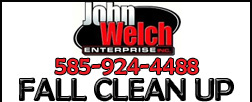Cleaning cemetery headstones
by Lynne Belluscio
LE ROY PENNYSAVER & NEWS - JUNE 9, 2019
As LeRoy, N. Y. was getting ready last week for Memorial Day, there was a lot of activity at the local cemeteries. Volunteers were placing flags on veterans’ graves. Midst the rain, the mowers were trying to get the grass trimmed. Folks were bringing pots of flowers to set on family graves. And a few folks were asking how to clean gravestones. What I am advising is to use the most up-to date and safest procedure that is available today. It’s called D2. Forget about all the “home remedies” and “that’s the way we’ve always done it” solutions. For the record, D2 is what is used on the Tomb of the Unknown Soldier, Mount Vernon, Monticello, The Metropolitan Museum of Art, the Alamo, West Point, the Whitehouse, the U.S. Capitol, the U.S Supreme Court, the Washington Monument, the Naval Academy, all Civil War National Cemeteries, Arlington Cemetery, Gettysburg Cemetery, as well as the National Park Service, and the Smithsonian Institution.
The problem with solutions of Clorox, ammonia, vinegar, cleaning fluid, soap, shaving cream, and all the other stuff that people have been using, is that they are chemicals that leave a residue (no matter how well you rinse them off ) of either basic or acidic salts that react with the stones. It’s easy to think that granite is impervious. After all it is used for kitchen counters, but that granite is sealed to keep it from absorbing. Gravestones are not sealed. They are affected by acid rain, and the water running off of trees and leaves. They can support lichen and moss and mold because they are porous. Most solutions that kill moss, mildew, lichen, and mold leave a residue that damages the stone. For that reason, a new cleaning solution was developed by preservationists.
Its commercial name is D2. It is a nearly pH neutral quaternary ammonium solution with surfactants that help carry surface contaminants away. It can be used on many surfaces:
marble, granite, limestone, sandstone, slate, masonry such as brick and cast stone, concrete, aluminum, wood, vinyl, and aluminum siding, and canvas. (Think I’m going to try it on my deck awning.) It does not react with glass or metals and it does not kill shrubs or grass. You do not have to wear rubber gloves. D2 is biodegradable. After a contact time of 10 to 15 minutes, followed by scrubbing with a soft nylon or natural bristle brush, most of the mold and staining will begin to loosen. Marble is soft and porous. Sometimes, it is so soft that even scrubbing can do damage. Marble is the stone used frequently by the Veterans Department for veteran’s stones. These stones frequently turn black. Sometimes these stones cannot be scrubbed without doing damage, so the D2 solution is just sprayed on and left to gradually clean the stone. Yes, D2 is more expensive than a bottle of Clorox or ammonia. It is cheaper by the gallon, but you won’t need that much unless you plan to share some with a friend or plan to do a lot of stones. A spray bottle is enough to do several stones. You can also invest in a small pump bottle which is easier than pushing on a plunger. And you can use cheap plastic scrappers and wooden craft sticks. Scrubbing can be done with a soft bristle brush - sometimes an old toothbrush helps. Never, never, never, a wire bristle brush or steel wool or a steel scrubber!!!
If you need a tutorial, you can find several on the internet and Youtube
The Friends of Machpelah Cemetery will have several workshops this year. A small fee will be charged to cover materials.
A cleaning kit, including a spray bottle of D 2, scrapers, brushes and a small bucket will also be available for a minimal price. If you are interested in the workshops, contact the Historical Society at [email protected] or call 768-7433 and leave your name and phone number and email and we will notify you when the next workshop is scheduled.
D 2 can be purchased at
H D Construction Supply Company
at 1140 Lehigh Station
Road in Henrietta. A spray bottle
is under $20.










